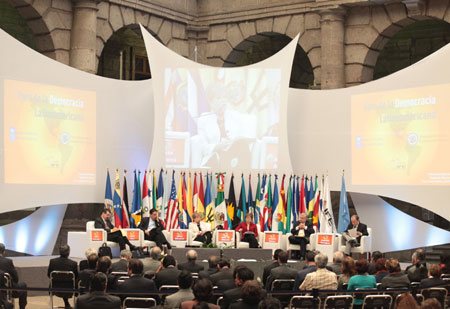Inequality Undermines Political Stability and Erodes Consensus
Topic(s)
Alicia Bárcena participated in two forums on the Latin American reality in Mexico City.

(14 October 2010) "Sooner or later, inequality undermines political stability and erodes the consensus on which development strategies are based," said ECLAC Executive Secretary Alicia Bárcena during the international seminar The Opportunity of the Bicentennial: 1910-2010, held today in Mexico City.
In her presentation during the seminar, she asserted that equality is a key element of development.
"Today, in Mexico as well as in the rest of the region, the demand for equality and development has gained more importance in light of the impact of the global crisis begun in 2008. The crisis has led to a reconsideration of the development agenda and the need to reinstate equality as one of its intrinsic elements and values," she stated.
The seminar was organized by the Democracy and Development Foundation, the Carolina Foundation, the Center for Economic Research and Teaching, the Vidanta Group Foundation and the magazine Nexos.
The Executive Secretary of ECLAC stressed that the equality of rights provides a standard framework and is the basis for creating social agreements that could lead to greater and better opportunities for the neediest.
After acknowledging the grandeur of the indigenous cultures in the region before the conquest, Bárcena said that the history of Mexico and the region in general shows that attaining development requires national density and a long-term perspective of the country.
"For this to happen, the State must have sufficient resources to be able to implement policies that boost growth, foment productivity, foster greater territorial articulation, aim at better labour conditions and institutions, and provide public goods and social protection with a clear universalist and redistributive vocation," she noted.
Mexico, said Bárcena, urgently needs fiscal reforms that may provide the State with the funds it needs to apply effective policies, among them, an exchange rate that may avoid the constant currency appreciation that undermines competition and investment, and others aimed at strengthening certain sectors and encouraging innovation, focused on fomenting development banking.
In Mexico, Bárcena also participated in the Latin American Democracy Forum, where she stated that Latin America continues to be the most unequal region in the world, despite the progress made in recent years.
The forum, held 12-14 October, gathered renowned international panelists to reflect on democracy and inequality in Latin America and was organized by the United Nations, the Organization of American States (OAS) and Mexico's Federal Electoral Institute.
Participants included former presidents Carlos Mesa (Bolivia), Ricardo Lagos (Chile), Carlos Salinas (Mexico) and Julio María Sanguinetti (Uruguay). Other panelists included OAS Secretary General José Miguel Insulza, Ibero American Secretary General Enrique Iglesias and Mexican businessman Carlos Slim.
At the Democracy Forum, Bárcena asserted that a new social contract is needed to depart from the polarization that leads to deeply fractured societies lacking full equality. "The solution is to define what kind of country we want in the long run and establish a new equation State-market-society," she said.
Bárcena added that the economy should not be an issue that is discussed solely by technocrats or only by citizens. For democracy to work well and development to flourish, technical experts need to design and propose economic development policies to attain the priority objectives set by citizens, taking into account and making explicit their social and environmental impact, she explained.
For enquiries, please contact ECLAC's Public Information and Web Services Section.
Email: dpisantiago@cepal.org; telephone: (56-2) 210-2040.
Country(ies)
-
Mexico
Contact
Public Information Unit
- prensa@cepal.org
- (56 2) 2210 2040